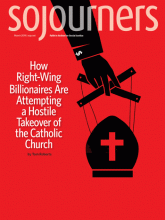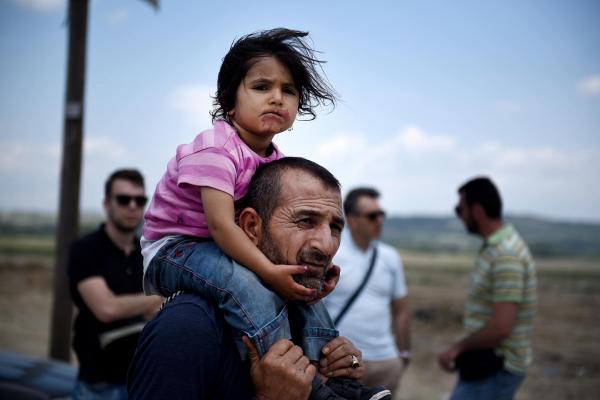THE DEUTERONOMY PASSAGE that ushers in our Lenten pilgrimage underscores the sacred mandate to embrace foreign immigrants with generous hospitality. Instructions for the liturgy for harvest thanksgiving conclude: “Then you, together with the Levites and the aliens who reside among you, shall celebrate with all the bounty that the Lord your God has given to you” (26:11). Worshippers are required to certify in the assembly before God that they have participated in providing what the vulnerable in society need, not least refugees. “I have removed the sacred portion from the house, and I have given it to the Levites, the resident aliens, the orphans, and the widows” (verse 13). Paul speaks of the Spirit of freedom removing the veil that blinds us to the core meaning of the sacred texts. In the current climate of xenophobia and incitements to make refugees into scapegoats, Christians are called to rip down the veil that prevents people from hearing this Word.
As for the intimate personal dimension or Lenten conversion, this might be the time to realize more profoundly that much of our own sinfulness and confusion arises from the harshness with which each one of us rejects and starves elements of our own inner “community of selves,” those parts of our humanity we try to disclaim and repress. It is the Spirit’s inner work of integration that teaches us to embrace those “selves of the self” we find ugly, pathetic, needy, or too passionate and creative for comfort. Our outer practice and inner practice of hospitality and inclusion belong together.
[ March 3 ]
Radiation Exposure
Exodus 34:29-35; Psalm 99; 2 Corinthians 3:12-4:2; Luke 9:28-43a
“And all of us with unveiled faces, seeing the glory of the Lord as though reflected in a mirror, are being transformed into the same image from one degree of glory to another; for this comes from the Lord, the Spirit” (2 Corinthians 3:18). The Epiphany season’s celebration of the glory of God revealed in the face of Jesus Christ concludes with the theme of transfiguration (metamorphosis is the Greek word). The appointed scriptures are the key for understanding the dynamic of Lent as we prepare to enter that season of renewal. Our transformation can never be accomplished by conforming to external imperatives, nor by the embracing of “values,” however lofty and demanding. Our moral transformation works through contemplation of the open heart of God exposed in the self-giving life of Christ, a kind of contemplation as “radiation therapy” in which our inner falsity is irradiated by the beams of God’s unbounded, costly love, lived out by Jesus through his “exodus” (Luke 9:31) into the cross.
Prayer is the perpetual treatment in which, little by little, we deepen our participation in the divine life of vulnerability, transparency, and truthfulness. “We have renounced the shameful things that one hides; we refuse to practice cunning or to falsify God’s word” (2 Corinthians 4:2), but this is not the result of our own program of moral effort; it rises from “the Lord, the Spirit” doing the work of inner liberation in us while we are steadfastly fixing our gaze on Jesus.
Read the Full Article

